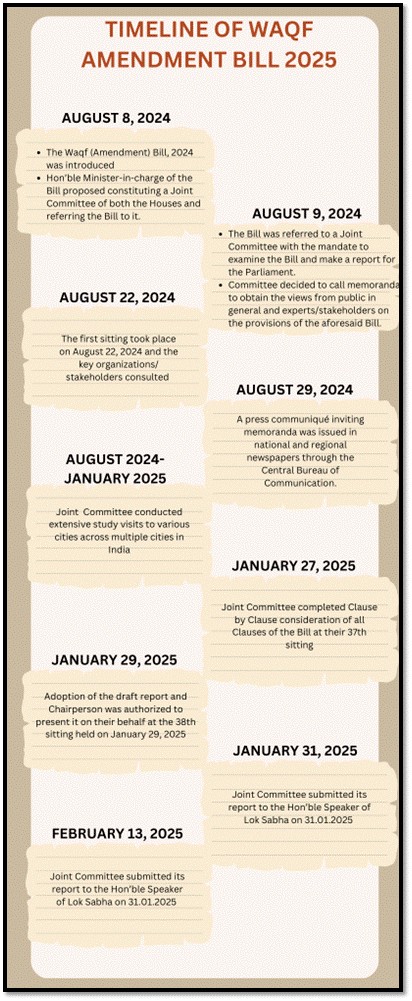Ministry of Minority Affairs
Waqf Amendment Bill, 2025: Reform through Stakeholder Engagement
प्रविष्टि तिथि:
04 APR 2025 3:45PM by PIB Delhi
Introduction
The Waqf Amendment Bill, 2025 was introduced to fix problems in the management and governance of Waqf properties. The aim is to make rules clearer, include more people in decision-making, and improve how Waqf assets are used.
On August 8, 2024, two bills were introduced in the Lok Sabha; Waqf (Amendment) Bill, 2024 and Mussalman Wakf (Repeal) Bill, 2024. These bills aim to make Waqf Boards work more smoothly and ensure Waqf properties are managed well.
The Mussalman Wakf (Repeal) Bill, 2025 seeks to repeal the Mussalman Wakf Act, 1923, which was created during British rule and is now outdated. Removing this old law will help create a more consistent, transparent, and accountable system under the Waqf Act, 1995, removing confusion caused by the old law.
The Waqf (Amendment) Bill, 2025 aims to update the Waqf Act, 1995, to solve problems in managing Waqf properties. It proposes several improvements, such as:
- Overcome the shortcomings of the previous act and enhance the efficiency of Waqf boards by introducing changes such as renaming the Act
- Updating the definitions of Waqf
- Improving the registration process
- Increasing the role of technology in managing Waqf records.

Distinctive aspects of this Bill:
- On August 9, 2024, both Houses of Parliament agreed through separate motions to send the Bill to a Joint Committee for review and a report. This Joint Committee included 21 Members from the Lok Sabha and 10 Members from the Rajya Sabha.
- Since the Bill is important and has a broad impact, the Committee decided to gather opinions from the public, experts, stakeholders, and other relevant organizations on its provisions.
- The first sitting took place on August 22, 2024 and the key organizations/ stakeholders consulted during the sittings were:
- All India Sunni Jamiyatul Ulama, Mumbai;
- Indian Muslims of Civil Rights (IMCR), New Delhi
- Muttaheda Majlis-e- Ulema, J&K (Mirwaiz Umar Farooq)
- Zakat Foundation of India
- Anjuman E Shiteali Dawoodi Bohra Community
- Chanakya National Law University, Patna
- All India Pasmanda Muslim Mahaaz, Delhi
- All India Muslim Personal Law Board (AIMPLB), Delhi
- All India Sufi Sajjadanashin Council (AISSC), Ajmer
- Muslim Rashtriya Manch, Delhi
- Muslim Women Intellectual Group - Dr. Shalini Ali, National Convener
- Jamiat Ulama-i-Hind, Delhi
- Shia Muslim Dharamguru and Intellectual Group
- Darul Uloom Deoband
- The Joint Parliamentary Committee held 36 meetings, where they listened to the opinions and suggestions of representatives from different Ministries, Departments, State Governments, State Waqf Boards, and experts/stakeholders. In total, they received 97,27,772 memoranda through both physical and digital modes.
- To thoroughly review the Waqf Amendment Bill, 2024, the Committee conducted detailed study visits across multiple cities in India. The details of the study visits in 10 cities are as under:
- 26.09.2024 to 010.2024: Mumbai, Ahmedabad, Hyderabad, Chennai and Bengaluru
- 09.11.2024 to 11.11.2024: Guwahati, Bhubaneshwar
- 18.01.2025 to 21.01.2025: Patna, Kolkata and Lucknow
- The Committee had in-depth discussions, interacting with 284 stakeholders, 25 State Waqf Boards, 15 State Governments, 5 Minorities Commissions, and 20 Ministers/MPs/MLAs/MLCs. These visits helped Committee members understand the situation on the ground and collect region-specific insights.
- The Waqf (Amendment) Bill has 44 Clauses and the Joint Committee on Waqf Amendment Bill (JCWAB) has recommended changes in 19 Clauses.
- The Joint Committee submitted its report to the Hon'ble Speaker of Lok Sabha on 31 January 2025, and the report was laid before both Houses of Parliament on 13 February 2025.
An example of recommendations submitted:
The All India Pasmanda Muslim Mahaaz, an organization working for their upliftment, presented its suggestions before the Joint Committee on the Waqf (Amendment) Bill, 2024.
- Introduction of an Appellate System
- Better Management of Waqf Records
- Stricter Penalties for Encroachment and Misuse
- Disqualification of Board Members Involved in Irregularities
- Proper Utilization of Waqf Property Revenue
- Empowering Senior Revenue Officials for Fair Inquiry
Conclusion
The Joint Parliamentary Committee Report on the Waqf (Amendment) Bill, 2024 highlights the effort to make Waqf property management fair, transparent, and efficient. The Committee listened to different viewpoints, conducted study visits, and had detailed discussions to address the concerns of stakeholders. The proposed changes in the Bill aim to create a more inclusive and responsible system that meets the changing needs of society.
Click here to download PDF
*******
Santosh Kumar/ Ritu Kataria/ Kritika Rane
(रिलीज़ आईडी: 2118763)
आगंतुक पटल : 8296